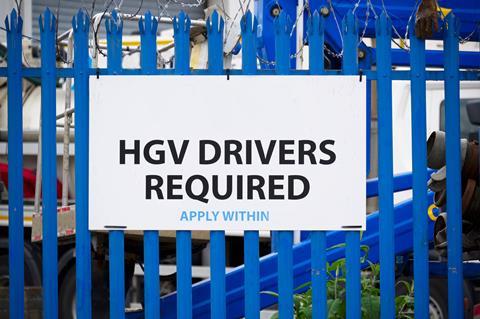Despite a mid and post-pandemic recruitment surge in the sector, and hourly median pay for full-time HGV drivers rising by 27% between 2020 and 2023 to combat the shortage during Covid, the transport industry is once again facing a decline in the number of full-time drivers.
Based on predicted economic growth, the RHA reports that by 2029 there will be a need for 740,000 HGV drivers to support the UK logistics sector, compared to the estimated 684,000 currently. The aging workforce is largely to blame, with data revealing less than 2% of lorry drivers in the UK are under the age of 25.
There are a myriad of reasons why driving HGVs is a great career option for young adults. It isn’t just a job, it’s an essential part of the economy and offers stability, good pay and freedom. Those in this profession have strong job security and great earning potential, especially those specialising in ADR (dangerous goods) or HIAB (mechanical lifting equipment).
HGV driving is also an independent role, no office politics and no desk work. The variety of routes, from local deliveries to international hauls, means no two days are the same. Flexibility too, with different shift patterns so you can balance work and life.
The benefits of a career in transport and haulage
1. Competitive salary
With Google searches for ‘HGV driver salary’ reaching 3,000 per month 2, it’s clear we’re interested in the earning potential of life on the road. Due to driver shortages during the pandemic, the hourly median pay for full-time lorry drivers rose by 27% to £14.99 between 2020 and 2023 1. Compared to the latest National Living Wage (from April 2025) of £12.21, HGV drivers could be making more than 20% more than those on the NLW.
Experienced drivers, especially those with specialist qualifications, have the opportunity to earn even more and the opportunity for career progression can see full-time lorry drivers move into even higher-paying roles such as fuel tanker or hazard materials drivers (between £17 and £21.25 per hour, according to Indeed.)
2. Job security and demand
The transport of goods across the UK and between Europe can be an unsocial job, but it is one that keeps the economy ticking thanks to the thousands of lorry drivers playing a crucial role in the efficient delivery of goods every day.
The logistics and transport industry is essential to the smooth running of the country and there is a constant demand for HGV drivers. Coupled with the aging workforce and frequent shortages of full-time drivers, there will always be good job opportunities and long-term security within the industry.

3. Freedom and independence
With opportunities to travel across the UK and into Europe for international jobs, the variety of work and travel opportunities include long-and-short-haul, local delivery jobs, fuel tankers, refrigerated goods, and more. As well as this, there are various shift patterns on offer, with many choosing schedules that allow for much needed social breaks in between hauls.
4. Supporting the community
Phil Marshall, MD of Marshall Brothers Transport tells Smith Bros that being on the road so much means HGV drivers also have to be the unofficial heroes of the road when possible.
I think as drivers you have a responsibility to look after others on the road. We spend most of our time driving, we can see where the potential danger lies and have plenty of experience in how to make a dangerous scene safer. Emergency services can’t be everywhere all the time, so having basic first aid knowledge and equipment in the cab can literally be the difference between life and death.
5. Training and support
Google searches for ‘HGV training’ are up by +5% compared to last month, seeing around 46,000 searches from interested Brits 2.
As well as options for career progression and self-employment opportunities, many HGV companies also offer training and support to those entering the workforce. Many will fully-fund HGV training and licences, and apprenticeships are also regularly offered for new drivers.
While hauling goods might not seem the most fancy of jobs, the industry does incentivise drivers with competitive remuneration packages that include not just overtime, performance bonuses and additional allowances when on shift, many companies also provide workplace pensions, private health insurance and paid holidays to full-time drivers.
It’s clear people are interested in learning more about what perks there are to driving HGVs and a career in transport and haulage. To enter the industry, it usually takes around 8-10 weeks of training to obtain a license to drive a lorry. While the practical and theory tests only take around 5 days, providing you already have a regular drivers licence, it can take time to actually acquire the HGV licence needed to hit the road.
You’ll also need to complete a medical exam, which ensures you don’t have any illnesses or conditions that could impair you in a full-time driving role. This is an essential part of obtaining a licence.
There are plenty of job openings and apprenticeships to get on-the-job training, plus good pay, travel opportunities and a sense of freedom. Being a HGV driver is a great and sustainable career for those who love the open road and take pride in keeping the country moving.
Phil Marshall, MD, Marshall Brothers Transport















